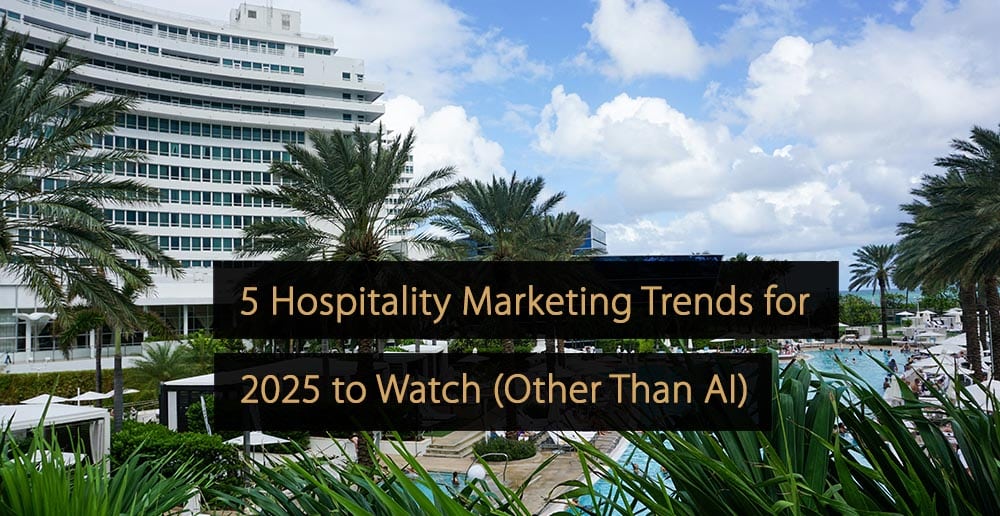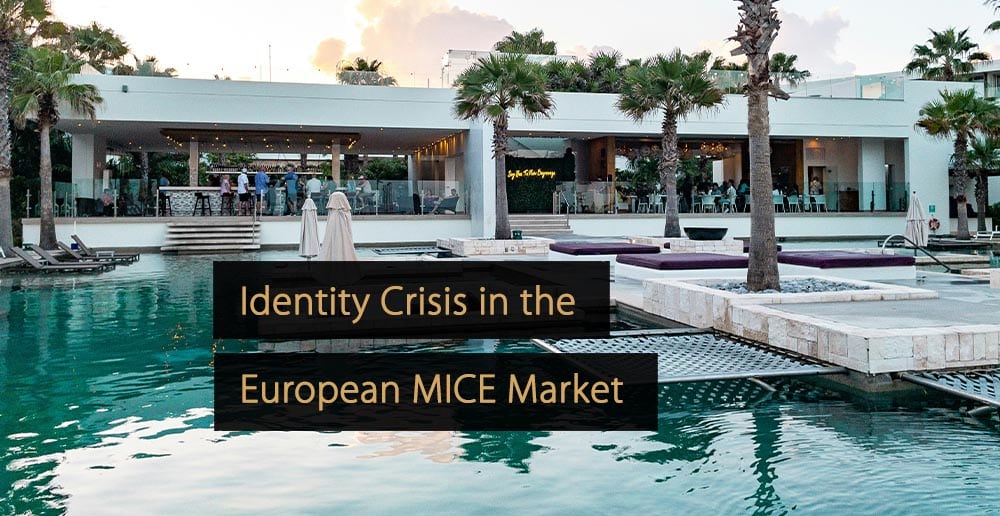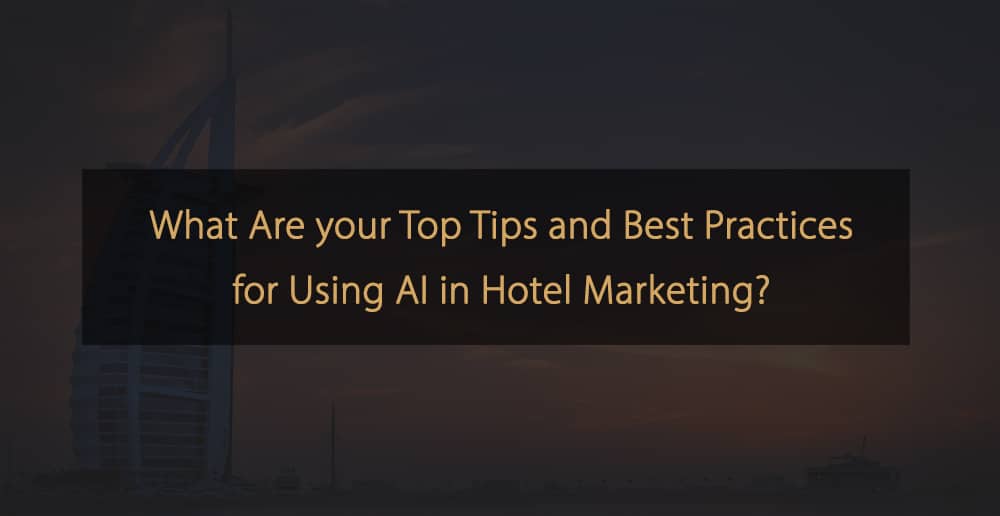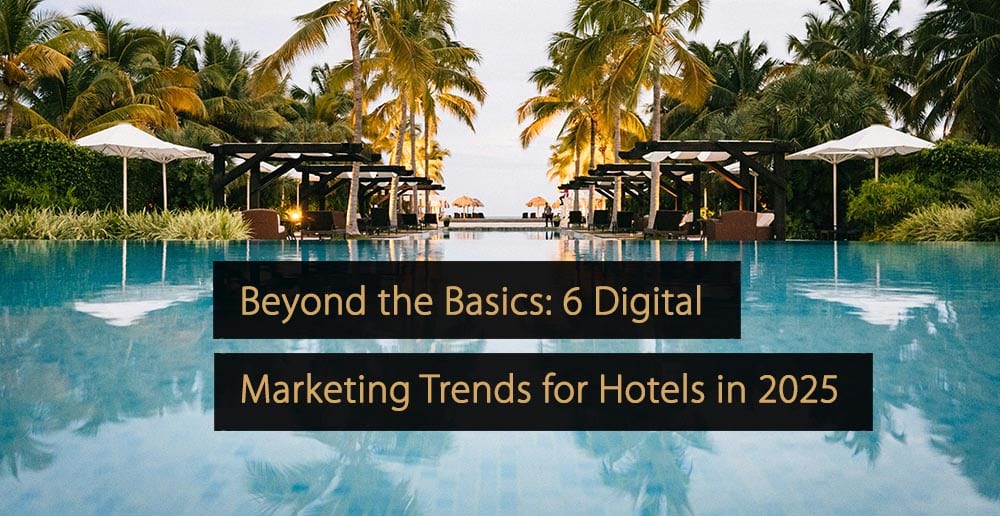The hospitality industry continues a transformative shift in 2025. Gone are the days when a robust digital presence and competitive pricing alone could ensure success. Today’s guests seek more than just a place to stay, they want experiences that enhance their lives, support their wellbeing, and align with their values.
Beyond AI: Key Hospitality Trends Driving Growth
Yes, generative artificial intelligence (AI) is revolutionizing almost every aspect of the hospitality industry, but the use of AI isn’t the only trend to lean into.
The hospitality landscape has been fundamentally reshaped by several key factors. The global pandemic has permanently altered travel behaviors and guest expectations. A heightened focus on personal and mental wellness has emerged as a dominant force in travel decisions. Meanwhile, sustainability concerns and privacy considerations have moved from peripheral issues to central decision-making factors.
Recent industry data reveals a compelling story; properties embracing emerging marketing trends are seeing up to 30% higher booking rates and 25% better guest satisfaction scores, and early adopters of innovative marketing strategies show 31% better revenue growth over their competitors.
For hoteliers of all sizes, the message is clear; adapt and innovate, or risk falling behind.
5 Hospitality Marketing Trends
Here are five key trends (other than AI) that will define hospitality marketing in 2025.
1. Social Commerce Integration
The intersection of social media and e-commerce has created a powerful new channel for the hospitality industry. TikTok and Instagram have evolved from a space where users scroll past vacation pics to a place where they can book their next vacation.
Statista predicts social media commerce will account for a whopping 17% of all digital transactions by 2025. Properties that embrace a future where transactions happen right on social media, without redirecting to a third-party site, will have a significant competitive advantage.
Direct Booking Through Social Platforms
Properties are implementing:
- Shoppable posts on Instagram and TikTok
- Native checkout experiences
- Social-exclusive rates
- Influencer collaboration platforms
User-Generated Content Strategy
Polished, brand content will always be essential, but in some cases user-generated content (UGC) is driving higher conversion rates than professional content, as UGC is often considered more authentic and trustworthy.
Recent data shows that 79% of people say UGC has a big impact on their purchasing decisions. Further, consumers find UGC more than nine times more impactful than influencer content.
Leveraging UGC will continue to be a popular trend in the years ahead, particularly for properties looking to court younger travelers. To encourage the creation of UGC, consider the following tactics;
- Consistently including a strong call-to-action in posts
- Organizing UGC competitions
- Displaying social media handles on property
- Promoting a brand hashtag
2. Wellness and Experiential Marketing: The New Competitive Edge
The wellness tourism market is projected to reach $1.1 trillion by 2025, representing one of the most significant opportunities in hospitality marketing. This isn’t just about promoting the spa or the gym, it’s about reimagining the entire guest experience through the lens of wellness and personal growth.
Health and Wellness Programming
Leading properties are creating comprehensive wellness ecosystems. The Four Seasons Hong Kong, for example, recently reported a 40% increase in booking value after introducing their “360° Wellness Journey” program, which includes personalized wellness itineraries, sleep optimization programs, and holistic health assessments.
A comprehensive study by CBRE Hotels Research (2024) reveals that properties with integrated wellness programs command an average daily rate premium of 35% over comparable properties. The American Hotel & Lodging Association’s Wellness Tourism Report (2024) shows that 72% of luxury and upper-upscale hotels plan to significantly expand their wellness offerings by 2025.
Key elements of successful wellness programming include:
- Personalized wellness assessments and itineraries
- Mental health and mindfulness offerings
- Partnerships with certified wellness practitioners
- Sleep enhancement programs
- Nutrition consultation services
Corporate Wellness Tourism
Perhaps the most surprising development is the surge in corporate wellness tourism. With companies increasingly focused on employee wellbeing, properties that can offer comprehensive corporate wellness packages are seeing tremendous growth. Industry forecasts suggest corporate wellness bookings will grow by 45% come 2025.
Experience-Based Marketing
The data is compelling: experience-focused stays are showing 40% higher booking values than traditional room-only offerings. Properties are responding by creating immersive experiences that connect guests with local culture, cuisine, and activities.
Successful experience-based marketing programs often include:
- Local culture immersion packages
- Culinary journey programs featuring local chefs
- Skill-building retreats and workshops
- Adventure tourism integration
- Authentic community interaction opportunities
3. Sustainability as a Core Marketing Message
In the eyes of travelers, a focus on sustainability has evolved from a nice-to-have feature in a hotel to a fundamental expectation. A striking 82% of travelers now consider environmental impact in their booking decisions, making sustainable practices not just an ethical choice but a business imperative.
Environmental Initiatives
Leading properties are implementing comprehensive sustainability programs that include:
- Real-time carbon footprint tracking and offsetting
- Water conservation technology
- Waste reduction programs
- Renewable energy adoption
- Sustainable supply chain management
The key to success lies in making these initiatives visible and engaging to guests without appearing performative. Properties like the 1 Hotels group have masterfully integrated sustainability into their brand identity, resulting in a 35% increase in direct bookings among environmentally conscious travelers.
Authentic Eco-Marketing
Transparency has become the cornerstone of effective sustainability marketing. As a result, 77% of travelers say they are willing to pay a premium for demonstrably sustainable accommodations.
Properties are finding success with:
- Monthly environmental impact reports
- Guest engagement in green initiatives
- Local community impact programs
- Third-party sustainability certifications
- Educational programs and workshops
4. Voice Search Optimization: The New Frontier of Digital Marketing
With voice search projected to account for more than a third (38%) of all travel-related searches by 2025, optimizing for voice has become crucial. Properties that fail to adapt risk becoming invisible to a growing segment of potential guests.
Voice-First Marketing Strategies
Successful voice search optimization requires:
- Natural language keyword optimization
- Question-based content structure
- Local search optimization
- Voice-friendly schema markup
Voice-Enabled Guest Services
Properties are also leveraging voice technology to enhance the guest experience, with one recent study indicating that 58% of guests prefer voice-enabled rooms, with this percentage rising to 73% among millennial travelers.
Leading hotels are implementing:
- Customized in-room voice assistants
- Voice-controlled amenities
- Voice-based concierge services
- Multi-language support systems
5. Privacy-First Digital Marketing
As data privacy regulations tighten globally, successful marketing strategies must prioritize guest privacy while maintaining personalization.
First-Party Data Strategy
Properties are developing sophisticated strategies for first-party data collection and usage:
- Value exchange programs
- Direct booking incentives
- Transparent data policies
- Regular privacy updates
- Customer control panels
Cookie-less Marketing Solutions
With third-party cookies being phased out, alternative tracking methods are becoming essential:
- First-party cookies
- Contextual advertising
- Privacy-safe analytics
- Consent-based marketing approaches
Implementation Guide for Marketing Managers
To successfully implement these trends, consider the following approach:
- Audit Current Capabilities
- Assess the existing technology stack
- Evaluate team skills and capabilities
- Review current marketing strategies
- Prioritize Initiatives
- Focus on quick wins first
- Build comprehensive roadmap
- Align with budget cycles
- Measure and Adjust
- Set clear KPIs
- Monitor ROI
- Make data-driven adjustments
Positioned to Thrive in 2025
The hospitality marketing landscape of 2025 demands a delicate balance of wellness integration, sustainability commitment, and guest privacy respect. Success will come to those who can effectively integrate these trends, either on their own or with the guidance of an experienced marketing partner, while maintaining authentic guest relationships and delivering measurable business results.
Properties that establish strong foundations in these areas now will be well-positioned for success not just in 2025, but in the years beyond. The key is to start implementing these changes sooner rather than later, measuring results carefully, and adjusting strategies based on performance data and guest feedback.
The future of hospitality marketing lies in adaptability and innovation. By embracing these trends, you’ll not only meet evolving guest expectations but also position your property for long-term success. Explore these strategies today to stay ahead in 2025 and beyond!
Free Hotel Case Study: How Marketing Personalization Motivates Travelers and Drives Bookings for Hotels
In this compact case study, you’ll find data showing the importance of marketing personalization to the average traveler. Download the case study to learn how any hotel with a digital footprint can use marketing personalization to increase conversions.
Click here to download the case study “How Marketing Personalization Motivates Travelers and Drives Bookings for Hotels”.
More Tips to Grow Your Business
Revfine.com is the leading knowledge platform for the hospitality and travel industry. Professionals use our insights, strategies, and actionable tips to get inspired, optimize revenue, innovate processes, and improve customer experience.Explore expert advice on management, marketing, revenue management, operations, software, and technology in our dedicated Hotel, Hospitality, and Travel & Tourism categories.









Leave A Comment